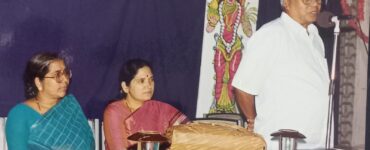Telugu: Sadanand Sarada
[This story was written when postcards were the only means of communication between village folks. As most of them were illiterate, people without scruples exploited their vulnerability for the simple gesture of reading out their letters or writing a reply on their behalf.
A prolific writer of yesteryears, Pakala Sadanand Sarada, always stood behind the exploited and the underprivileged.]
*
There was no road to that village.
There is no wonder. Many villages in India did not have road and other common facilities: you do not find a hospital; and you do not find a school. But what you can find everywhere is illiteracy… penury… and innocence. And to perpetuate that, they were winding up even those single-teacher schools.
There was no post office available in that village. For two or three villages put together, there was just a common postbox hanging from the branch of a tree in some remote corner, far from that village.
Collecting the letters for all the villages in its vicinity a postman would come, either by foot or by cycle, and distribute them. Once he arrived and stood near the large stone bench at the center of the village, it would create quite a commotion among the country folk. They would be scared to death pitying ‘who got the letter?’
The letter to anybody in the village was as frightening as a tsunami.
Aren’t people there in the towns who would still fear the very word ‘telegram‘?
It was estimated that eighty percent of the population lives in the villages in India. And there was another estimate that ninety percent among them were illiterate. Having spent crores of rupees to obtain those estimates, they cannot go wrong.
So, we must take it that ninety percent of that village was illiterate.
Should any of those illiterate families receive a letter, lo, it was an insurmountable challenge for them to know its contents. Until someone read and conveyed the contents, they suffered from the agony of some imaginary sad news contained therein.
To the village folk, the darlings of hardships, it adds as one more to the already long inventory.
Not that there were no educated people in that village. But they never read out letters, or write on their behalf, for people of lower caste. It was below their dignity to do so.
Poor illiterate folk! They cannot afford to go to the hamlets of better educated upper caste people. They would just pare off their skin for stepping into their hamlet.
*
“Kanakayya… Kanakayya…” the post man called out.
Kanakayya was an agricultural laborer.
Scared and thoroughly alarmed, Kanakayya walked up to the postman dragging his pole-like emaciated feet.
Postman pressed the post card into his hands and left the place.
Kanakayya turned the post card this side and that side. He was illiterate. He could not even identify the letters written there. A Postcard and a blank paper make no distinction for him!
Nobody ever dares the postman asking him to read the contents of any letter for them. Should anybody dare, his looks were enough … to lash them like whips. “The meager salary I get is not enough to carry the letters up to the village. And you want me to read them out for you? Huh!” he would censure.
Kanakayya deeply regretted at that moment that he did not get educated. He was ‘blind’ despite having his two eyes intact!
Kanakayya put two steps heavily and turned the letter on either side once again. He thought that it might be from his daughter. His son-in-law was a rickshaw puller in the town.
Poor child, if she got this letter written to him by somebody, she must be in some deep trouble. Kanakayya was disturbed and distressed. If only he had known one word… just one word in that letter, he could have made out something of it!
Else, his son-in-law might have got it written. Then, did something happen to his daughter? Was she unwell? He was rattled. He lost his nerve and trembled with fear.
*
There was only one person, named Krishna Murty, in that village who would help these illiterate people. Sitting on a mat in Padmasana and cleansing his eyeglasses frequently, he would read the letters for them. He would insist them to “Stand outside,” the threshold of his house and never permit them to cross it. But there was a catch. He never renders that service free. One should offer him a ‘measure’ of jowar or paddy to get the letter read to them and a reply written.
Kanakayya did not have a measure of paddy or jowar with him.
Neither had he a ‘measure’ of any grain for that matter.
All that he had was an accumulated grief of not finding any work for the past two days.
And a forced fasting of one and a half days!
He implored Seshayya, the village merchant, to lend him a measure of grain.
Seshayya refused saying he had exhausted all grain.
It is a strong conviction of some people that they cannot prosper in life without lying.
“I repay you with interest in kind. I am your slave,” Kanakayya pleaded.
“Didn’t you hear me say I have no grain with me? Get lost,” Seshayya vented his anger.
Lakshmamma, a Gaund and a toddy shop owner, was also a usurer, of both cash and kind.
“Sister, show some mercy upon me…” he begged her holding her hands.
She said no at first. After repeated requests she said she was busy and asked him to come the next day.
Kanakayya knew that Lakshmamma stood by her word. But how could he wait till the next day?
He was worried what misfortune befell his darling daughter. Tears swelled and rolled down his eyes looking at the letter. He could make nothing out of that postcard.
People who could read looked to him like incarnations of God at that moment!
He should offer a measure of grain to Krishna Murty to get that letter read out to him. But how could he mage?
With a heavy heart and worrying for his daughter’s health, he went back to Seshayya to entreat him once again.
“Why did you come again?” Seshayya did not hide his displeasure.
“Master, I prostrate before you.”
“Why don’t you listen to me when I say no?”
“Give me any work, I will do. But kindly lend me a measure of grain…” he prayed.
“Work? What work can I find you?” Seshayya made a round about his shop, his barn, his kitchen, and his back yard. Then he said,
“I can’t find any work for you other than cutting that trunk,” said Seshayya showing a heavy log of wood lying under the Neem tree,
“Break it into small pieces so that I can use it for my cooking stove…”
“I will do it, I am your slave,” said Kanakayya accepting the work.
He went on breaking that heavy log.
He was hungry having had nothing for the last one and half days. But he was more concerned about his daughter. The axe did not rest.
After converting the log into firewood, Kanakayya dried the sweat with his head gear.
“Did you complete the job? Then draw some water from the well into that tub before I give you a measure,” said Seshayya.
Kanakayya drew water from the well and filled the tub to its brink.
Only then did Seshayya gave a measure of grain… taking every precaution not to touch Kanakayya or his dhoti which would render him impure.
Kanakayya took that measure of grain to Krishna Murty to get his letter read. But his door was bolted from the inside. He was informed that Krishna Murty was dining.
He waited patiently till the doors were opened.
Krishna Murty came out, belching heavily.
Kanakayya saluted joining his hands together.
Krishna Murty gestured with his hand to Kanakayya which purported: “Stay where you are. Do not come forward.”
He never allows them to come forward!
Making Kanakayya sit one yard away from his doorstep, Krishna Murty sat on a small square mat of bulrush in Padmasana.
He leisurely picked his tooth with a piece of wood ready at hand.
Then he gestured towards Kanakayya with his eyes the purpose of his visit.
Pushing a plate forward and said, “Um!”
There was an almanac in his lap and the Ramayana, and the Gita were on the stool nearby.
Nobody knows for how many generations that brass plate was the bread winner for that family!
After formally accepting the grain offered, he said “Um!” once more.
Kanakayya put down the letter on the ground.
Krishna Murty read the letter carefully, checked the address on the letter and then opened his valuable lips to utter these words:
“This letter is not meant for you.”
Kanakayya was taken aback.
“Postman read out my name and gave it to me. I am your slave,” said Kanakayya.
“Why? Are you the only Kanakayya in this village? Your surname is Choppadamdi. Isn’t it?”
“Au…”
“This letter belongs to Chinta Gattu Kanakayya. Not you.”
“Is it? I am your slave.”
Kanakayya felt relieved and had a heavy load off his head. But the worry about the welfare of his daughter did not leave him.
Krishna Murty returned the letter to Kanakayya.
But he did not return the grain.
That was the state of affairs in that village!
What if the letter did not belong to Kanakayya? It helped the village merchant with the firewood he needed for his stove and a tubful of water!
What if the letter did not belong to Kanakayya? It brought Krishna Murty his measure of grain.
*
Walking dejected and downcast, Kanakayya encountered a youth on his way.
The youth said, “I want a room for rent, tata! Can I get one here?”
“Where are you from, my boy? What work do you have here?”
“I am an adult education teacher appointed to this village, tata. I teach the old people the alphabet and how to read and write during nights,” said the youth.
Kanakayya’s eyes gleamed with new light. The youth looked to him like a close relative who had come to bestow a new eye on the educationally blind like him.
*









Add comment